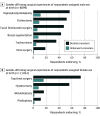Association Between Gender-Affirming Surgeries and Mental Health Outcomes
- PMID: 33909023
- PMCID: PMC8082431
- DOI: 10.1001/jamasurg.2021.0952
Association Between Gender-Affirming Surgeries and Mental Health Outcomes
Abstract
Importance: Requests for gender-affirming surgeries are rapidly increasing among transgender and gender diverse (TGD) people. However, there is limited evidence regarding the mental health benefits of these surgeries.
Objective: To evaluate associations between gender-affirming surgeries and mental health outcomes, including psychological distress, substance use, and suicide risk.
Design, setting, and participants: In this study, we performed a secondary analysis of data from the 2015 US Transgender Survey, the largest existing data set containing comprehensive information on the surgical and mental health experiences of TGD people. The survey was conducted across 50 states, Washington, DC, US territories, and US military bases abroad. A total of 27 715 TGD adults took the US Transgender Survey, which was disseminated by community-based outreach from August 19, 2015, to September 21, 2015. Data were analyzed between November 1, 2020, and January 3, 2021.
Exposures: The exposure group included respondents who endorsed undergoing 1 or more types of gender-affirming surgery at least 2 years prior to submitting survey responses. The comparison group included respondents who endorsed a desire for 1 or more types of gender-affirming surgery but denied undergoing any gender-affirming surgeries.
Main outcomes and measures: Endorsement of past-month severe psychological distress (score of ≥13 on Kessler Psychological Distress Scale), past-month binge alcohol use, past-year tobacco smoking, and past-year suicidal ideation or suicide attempt.
Results: Of the 27 715 respondents, 3559 (12.8%) endorsed undergoing 1 or more types of gender-affirming surgery at least 2 years prior to submitting survey responses, while 16 401 (59.2%) endorsed a desire to undergo 1 or more types of gender-affirming surgery but denied undergoing any of these. Of the respondents in this study sample, 16 182 (81.1%) were between the ages of 18 and 44 years, 16 386 (82.1%) identified as White, 7751 (38.8%) identified as transgender women, 6489 (32.5%) identified as transgender men, and 5300 (26.6%) identified as nonbinary. After adjustment for sociodemographic factors and exposure to other types of gender-affirming care, undergoing 1 or more types of gender-affirming surgery was associated with lower past-month psychological distress (adjusted odds ratio [aOR], 0.58; 95% CI, 0.50-0.67; P < .001), past-year smoking (aOR, 0.65; 95% CI, 0.57-0.75; P < .001), and past-year suicidal ideation (aOR, 0.56; 95% CI, 0.50-0.64; P < .001).
Conclusions and relevance: This study demonstrates an association between gender-affirming surgery and improved mental health outcomes. These results contribute new evidence to support the provision of gender-affirming surgical care for TGD people.
Conflict of interest statement
Figures


Comment in
-
Gender-Affirming Surgeries and Improved Psychosocial Health Outcomes.JAMA Surg. 2021 Jul 1;156(7):685-687. doi: 10.1001/jamasurg.2021.0953. JAMA Surg. 2021. PMID: 33909013 No abstract available.
-
Socioeconomic Factors, Urological Epidemiology and Practice Patterns.J Urol. 2022 Apr;207(4):916-918. doi: 10.1097/JU.0000000000002406. Epub 2022 Jan 7. J Urol. 2022. PMID: 34991330 No abstract available.
References
-
- Grant J, Motter L, Tanis J. Injustice at every turn: a report of the National Transgender Discrimination Survey. 2011. Accessed October 11, 2020. https://www.transequality.org/sites/default/files/docs/resources/NTDS_Re...
Publication types
MeSH terms
LinkOut - more resources
Full Text Sources
Other Literature Sources
Medical
Miscellaneous

